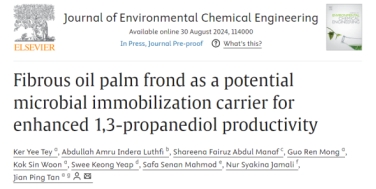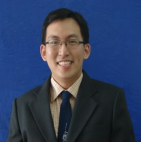The Research and Postgraduate Centre congratulates Tey Ker Yee, Asst. Prof. Dr. Mong Guo Ren, Assoc. Prof. Ts. Dr. Vincent Woon Kok Sin, Asst. Prof. Dr. Tan Jian Ping, from the School of Energy and Chemical Engineering, Prof. Dr. Yeap Swee Keong from the China-ASEAN College of Marine Sciences (CAMS), XMUM, for publishing in Journal of Environmental Chemical Engineering.
The Journal of Environmental Chemical Engineering is an SCI Q1 journal that specializes in the publication of original and innovative research related to the development of advanced, safe, green, and sustainable environmental technologies, which aims to contribute to the advancement of a carbon-neutral, circular, and self-sufficient bio-based economy. Its latest impact factor is 7.4.
Titled “Fibrous oil palm frond as a potential microbial immobilization carrier for enhanced 1,3-propanediol productivity”, this research is supported by the Ministry of Science, Technology and Innovation Malaysia (MOSTI) under Technology Development Fund 1 (TeD 1) Project “TDF07211418”. It is also supported by Xiamen University Malaysia Research Fund (XMUMRF) Project “XMUMRF/2022-C10/IENG/0047” and “XMUMRF/2023-C12/IENG/0060”.
In line with Sustainable Development Goal 12: Responsible Consumption and Production, the biotransformation of crude glycerol into 1,3-propanediol establishes a circular bioeconomy by converting regional crude glycerol into value-added green polymers. The technical article highlights the immobilization of locally isolated Clostridium butyricum JKT 37 on coconut shell activated carbon (CSAC), granular durian peel (GDP), or fibrous oil palm frond (FOPF) to ferment crude glycerol for the production of 1,3-propanediol. Superior cell adsorption on FOPF was supported by its high water absorption index (4.16 g/g) and morphology. The GDP immobilizer exhibited a higher immobilized cell density (9.20 g/L) and cell retention (0.18 g/g) than CSAC, although it showed no significant improvement in 1,3-propanediol production. The biological activity of the immobilized cells on FOPF was validated in 12-cycle repeated batch fermentations, achieving a 1,3-PDO yield and productivity as high as 0.68 mol/mol and 1.43 g/L·h, respectively.
This research demonstrates the high performance of the fibrous immobilizer and serves as a benchmark for future investigations into the use of agricultural waste to enhance the productivity of other bioprocesses.

This article can be found at https://doi.org/10.1016/j.jece.2024.114000

Tey Ker Yee: “It was indeed a great honour to publish this research paper in Journal of Environmental Chemical Engineering with the continuous support and guidance from my supervisor, Dr. Tan Jian Ping. I am also thankful for the continuous support from all the collaborators and funding agencies. I hope that this research work can provide useful insights to future researchers towards effective biobased 1,3-PDO production using immobilized cells.”

Ts. Dr. Vincent Woon is an Associate Professor and Head of the PhD Programme at Department of New Energy Science and Engineering. With a passion for sustainability, his research focuses on carbon footprint analysis, life cycle assessment, solid waste recycling, green township and building development, as well as AI-predictive analytics and optimization in climate change. Since joining XMUM in 2019, he has received several international awards, including the Study of the U.S. Institutes (SUSI) for Scholars Program and YSEALI Academic Seminar Fellowship by the U.S. Department of State, and CrossCulture Programme Fellowship by the German Federal Foreign Office.

Ir. Ts. Dr. Mong Guo Ren is an Assistant Professor at Department of New Energy Science and Engineering. His research focuses on converting waste through thermal technologies into bioenergy and bioproducts. He has received several research awards from research competitions (International Invention, Innovation & Technology Exhibition 2023, Pecipta’22, Omnipreneurship Awards 2021) and best presenter awards from international conferences (8th International Conference on Low Carbon Asia and Beyond 2022 Sustainable Development towards Carbon Neutrality).

Prof. Yeap Swee Keong earned his PhD from Universiti Putra Malaysia and currently serves as the Assistant Dean of the China-ASEAN College of Marine Sciences. His notable achievements include being listed among the global top 2% of cited scientists, serving as an international expert member for an AHEAD grant funded by the World Bank for a Sri Lankan government agency, and receiving multiple research funding awards linked to the Malaysian government and private sector.

Dr. Tan Jian Ping is an Assistant Professor and the Industrial Training Coordinator for the Chemical Engineering Programme at the School of Energy and Chemical Engineering. He is a founding member of Bio-Alliance, a consortium led by the National Institute of Biotechnology Malaysia, initiated by the Ministry of Science, Technology, and Innovation (MOSTI) to advance national bio-based technology development in agriculture, animal feed, and biotechnology. Additionally, Dr. Tan has been a committee member of the Malaysia Academic Research on Palm Oil Sustainability (ARPOS) since 2022.